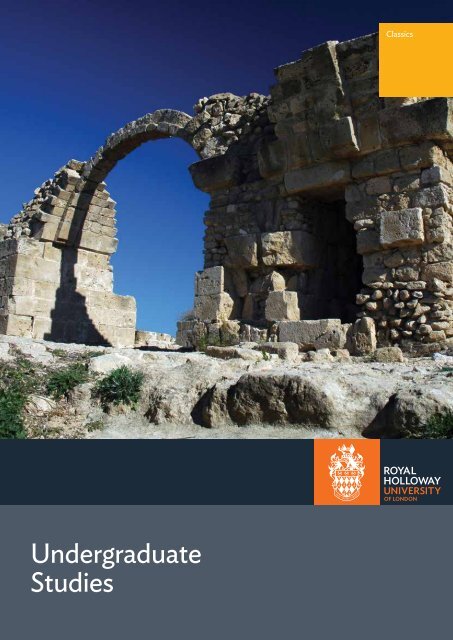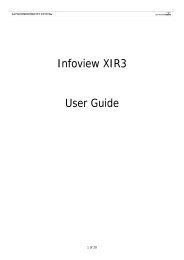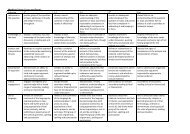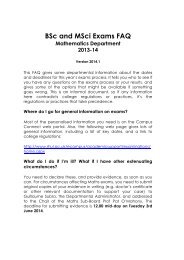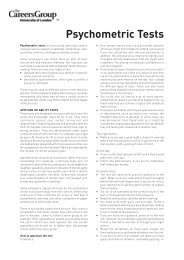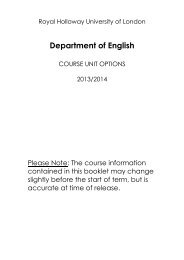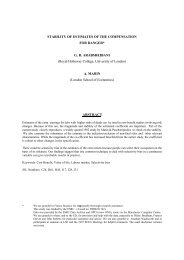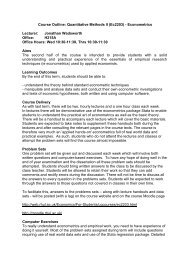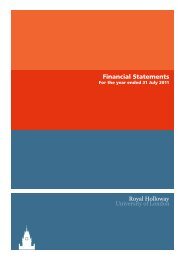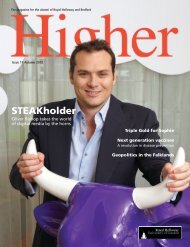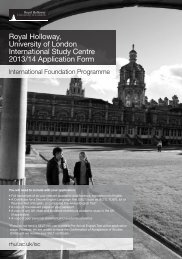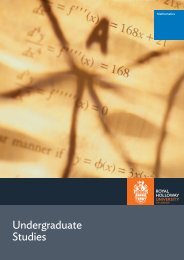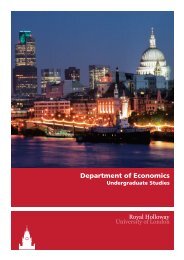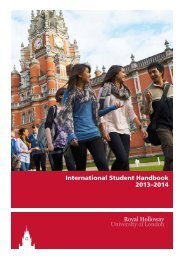Department of Classics - Royal Holloway, University of London
Department of Classics - Royal Holloway, University of London
Department of Classics - Royal Holloway, University of London
Create successful ePaper yourself
Turn your PDF publications into a flip-book with our unique Google optimized e-Paper software.
<strong>Royal</strong> <strong>Holloway</strong> is widely recognised on the worldstage as one <strong>of</strong> the UK’s leading teaching andresearch universities. One <strong>of</strong> the larger colleges<strong>of</strong> the <strong>University</strong> <strong>of</strong> <strong>London</strong>, we are strongacross the arts and humanities, sciences andsocial sciences. Our 8,500 students work withinternationally renowned scholars in 20 academicdepartments. The <strong>University</strong> <strong>of</strong> <strong>London</strong> degreegained by our talented, high-achieving graduatesis valued the world over.As a cosmopolitan community, with studentsfrom 130 countries, we focus on the supportand development <strong>of</strong> the individual. Our friendlycampus, just 19 miles west <strong>of</strong> central <strong>London</strong>,provides a unique environment for universitystudy. Campus social life revolves around theStudents’ Union, which runs over 100 societies andsports clubs, and we are recognised as <strong>London</strong>’sbest sporting college.2 <strong>Department</strong> <strong>of</strong> <strong>Classics</strong>
<strong>Classics</strong>ContentsThe <strong>Department</strong> <strong>of</strong> <strong>Classics</strong> at<strong>Royal</strong> <strong>Holloway</strong>, <strong>University</strong> <strong>of</strong> <strong>London</strong>is an international centre <strong>of</strong> excellencein research and teaching, promotingunderstanding and knowledge <strong>of</strong> theancient world and its culture.Our friendly, dynamic and forwardlookingdepartment caters for allinterests in all branches <strong>of</strong> Classicalliterature, ancient history, philosophyand archaeology from beginners topost-doctoral level.Find out more by visiting our websiteat royalholloway.ac.uk/classicsWhy study the Classical World? 4Why choose a Classical degree at <strong>Royal</strong> <strong>Holloway</strong>? 5Admissions and entry requirements 6Degree programmes 8Degree structure 9Teaching and assessment 10Other information 11Your future career 12“The lessons <strong>of</strong> the Classical World have valuein the 21st century”Boris Johnson, classicist and Mayor <strong>of</strong> <strong>London</strong>Academic staff 13This brochure is designed to complement <strong>Royal</strong> <strong>Holloway</strong>’s UndergraduateProspectus and information on the department’s website atroyalholloway.ac.uk/classicsIt is also available as a PDF at royalholloway.ac.uk/studyhereContact detailsHead <strong>of</strong> <strong>Department</strong>Pr<strong>of</strong>essor Ahuvia Kahaneahuvia.kahane@rhul.ac.ukAll enquiriesMrs Margaret Scrivnerm.scrivner@rhul.ac.ukAdmissions enquiriesAdmissions Tutor, Dr Christos Kremmydasclassicsucas@rhul.ac.uk or christos.kremmydas@rhul.ac.uk<strong>Department</strong> <strong>of</strong> <strong>Classics</strong>T: +44 (0)1784 443417F: +44 (0)1784 439855<strong>Department</strong> <strong>of</strong> <strong>Classics</strong>3
Why study the Classical world?• Our pasts are our identity. Our identity is our future:Without knowing where we have come from, we don’t knowwho we are. Without knowing who we are, we won’t know whatwe can be. The study <strong>of</strong> <strong>Classics</strong> is a vital part <strong>of</strong> the Westerntradition. Understanding the classical past is an exciting projecton its own but it also leads to a broad-minded evaluation <strong>of</strong> ourown present circumstances, and to the building <strong>of</strong> bridges withother cultures both within and outside the European tradition.• Thinking about first principles: The ancient Greeks andRomans asked, and provided some possible answers to, many<strong>of</strong> the basic questions <strong>of</strong> life to which we still need answers.What accounts for the present state <strong>of</strong> the world? What arewe here for? What does it mean to be human and to be a goodperson? How should we organize and rule ourselves and ourcommunities? How should we behave towards other people?What attitudes should we take to politics, money, law, work,religion, love or war?• Career opportunities: A single or joint honours degree in<strong>Classics</strong>, Classical Studies or Ancient History is a useful andattractive qualification no matter what you plan for the future.Many leaders, past and present, in public life, in businessand commerce, in industry and the pr<strong>of</strong>essions, in themedia, the arts and in academic life have had the benefit <strong>of</strong>a classical education. Studying classical culture providescritical thinking skills for life. Many employers regard adegree in a classical subject as an important advantage whenreviewing job applications.• Language skills: Language is our first social ‘tool’. Learningabout Latin and/or Greek can provide deep insights intothe workings <strong>of</strong> language in general and the basics <strong>of</strong> verbalcommunication. It can increase our English-languagecompetence and comprehension as well as improve the abilityto learn other languages.• ‘3D’ cultural vision – understanding other points <strong>of</strong> view:The ancient Greeks and Romans thought differently fromus about many things. Studying ancient culture and thoughtencourages us to see the world from more than one point<strong>of</strong> view. It promotes open-mindedness, flexibility andcritical thinking. You can begin to look at life from a new anddifferent perspective.“I still feel very fortunate to have been given the opportunity to readClassical Studies at <strong>Royal</strong> <strong>Holloway</strong>. It was a marvellous and memorableexperience. A classical degree gives you a variety <strong>of</strong> skills that makes youadaptable to many different pr<strong>of</strong>essions. The ability to comprehend and learndifferent languages, cultures and societies makes you great at multi-tasking.I will never forget my time in the <strong>Classics</strong> department at <strong>Royal</strong> <strong>Holloway</strong> andthe skills that it has provided me with for the rest <strong>of</strong> my life.”Gloria Cheng, BA Classical Studies 2008–114 <strong>Department</strong> <strong>of</strong> <strong>Classics</strong>
Why choose a Classical degree at <strong>Royal</strong> <strong>Holloway</strong>?WelcomeYour choice <strong>of</strong> university is one <strong>of</strong> the most importantyou will make. It’s vital to make an informed decision,and there’s no substitute for getting a real sense <strong>of</strong> theplace, the people and your College environment.As a College, and as a department, we are smallenough to make you feel like part <strong>of</strong> the family, butlarge enough to give you a big, confident head-start.We are a friendly community and we pride ourselveson the attention we pay to our students as individuals,from application stage to graduation and beyond.We know that at the end <strong>of</strong> your degree you will haveto head out into the world, so we begin preparing youfor success from the moment you arrive and evenafter you graduate. We will help you learn about theclassical past, teach you the languages (for those whowant to do so), challenge your thinking about antiquity,about the modern world, about ideas in general; wewill give you the tools to lead – whatever path youlater choose. We <strong>of</strong>fer flexible course options. Youcan combine the study <strong>of</strong> Classical subjects withDrama, English, Modern Languages, Philosophy, andmore. Our teaching staff are all active scholars andresearchers. They do not simply pass on other people’sanswers: they are the ones who develop them and areasking new questions. The excitement <strong>of</strong> discovery iswhat drives them, and is there for you in the classroom!Whether you are already studying the classicalworld or are moving into it for the first time, perhapsfrom a background in history, English, modernlanguages, social sciences, or even science and maths,<strong>Royal</strong> <strong>Holloway</strong> can provide you with the rest. All thatyou need is potential and enthusiasm.Pr<strong>of</strong>essor Ahuvia KahaneHead <strong>of</strong> <strong>Department</strong>Our students report high levels <strong>of</strong> satisfaction with our courses,giving us an excellent overall score <strong>of</strong> 96 percent in the 2012National Student Satisfaction Survey. For the quality <strong>of</strong> ourteaching we achieved very high scores <strong>of</strong> 92, 98 and two at 100percent satisfaction in the four areas assessed.We were highly rated in the latest Research Assessment Exercise(2008). Our courses are informed by cutting-edge research, andour staff are leading scholars in their chosen fields.We <strong>of</strong>fer a wide range <strong>of</strong> stimulating courses to suit all levels <strong>of</strong>previous experience for students with varied interests.Our courses <strong>of</strong>fer great flexibility, enabling you to choose coursesto develop your own strengths and special interests. We <strong>of</strong>fer fulltime and part time degree options.You will receive close personal attention at every stage <strong>of</strong> youruniversity career. We interview all our prospective (UCAS)candidates who meet certain basic requirements. Once enrolled,students are assigned a personal advisor from the department’sacademic staff, who can <strong>of</strong>fer academic and pastoral support.Students with special needs also have a dedicated support <strong>of</strong>ficerfrom within the department.To help you plan for the future, we <strong>of</strong>fer structured, long-termcareer development support with dedicated careers sessions forstudents in the department; a strong emphasis on transferableskills such as communication and presentation, teamwork andcritical thinking; skills highly valued by prospective employers.From 2013 two new skills courses are embedded into our firstyearcurriculum, designed to enhance research and personaltransferable skills, and a competitive work placement scheme inour second year – the only such scheme within a UK university<strong>Classics</strong> department.Our undergraduate degrees are designed to <strong>of</strong>fer opportunitiesto develop skills for postgraduate research, and to join our large,dynamic postgraduate community <strong>of</strong> students on Masters andPhD degrees.We are located in the inspiring, historic Founder’s Building, setin a green 135 acre campus, just 40 minutes by train to central<strong>London</strong>, where we share the facilities <strong>of</strong> Senate House and theInstitute <strong>of</strong> Classical Studies (in Russell Square) and one <strong>of</strong> theworld’s largest classical libraries.<strong>Department</strong> <strong>of</strong> <strong>Classics</strong>5
Admissions and entry requirementsThe department admits about 60 students each year froma diverse range <strong>of</strong> backgrounds. We are looking for the mosttalented and enthusiastic candidates.Entry RequirementsThese are our usual entrance requirements for Single Honoursprogrammes, provided for guidance only and may vary accordingto an applicant’s circumstances and previous experience. Therequirements for Joint Honours programmes may be higher.A-levels: AAB/ABB 320 UCAS pointsScottish Certificate <strong>of</strong> Education: AABBB at Higher LevelIrish Leaving Certificate: A2B3B3C3C3International Baccalaureate: 34 pointsFor international students: IELTS score <strong>of</strong> 6.5 overall with7 in writingAccess/Foundation courses: PassApplications, interviews & <strong>of</strong>fersYou do not need any previous experience <strong>of</strong> classical studies,ancient history or ancient languages to take most <strong>of</strong> our degrees(except <strong>Classics</strong>, Greek or Latin). All our courses will help you todevelop your transferable skills and you can combine your study<strong>of</strong> classical culture with study in a range <strong>of</strong> other disciplines e.g.English, History, Modern Languages, Philosophy, Politics. Ourfirst-year courses are specially-designed to introduce you toconcepts and material that may be new or which you may onlypartially have encountered before. Study <strong>of</strong> ancient language isencouraged (but not compulsory in many cases) and we ensureeveryone starts at the appropriate level, which is <strong>of</strong>ten beginners’.All applicants for undergraduate places must apply throughUCAS. Most applications are made online via ucas.comwhere searches for particular courses can be performed andapplications tracked. The UCAS code for <strong>Royal</strong> <strong>Holloway</strong> is R72.In your application we will look for your academic interests andreasons why you’ve picked your chosen degree programme.“One important reason why I chose to study <strong>Classics</strong> at<strong>Royal</strong> <strong>Holloway</strong> was that it was made clear on open daysthat you don’t need to be an expert before you begin.I had never studied this subject before, but the coursesare tailored to all levels <strong>of</strong> previous knowledge, whichmade my introduction to university life much easier.”Vicky Read, first year, BA Classical Studies6 <strong>Department</strong> <strong>of</strong> <strong>Classics</strong>
However, we are also interested in your broader personality. Thesort <strong>of</strong> things we look for in a personal statement may include:• how you first became interested in the classical world• what areas <strong>of</strong> study excite you most: literature, history,archaeology, philosophy, language?• what experience <strong>of</strong> anything classical you may already have• any connections you see between the classical and themodern world• any ancient sites or museums you may have visited and whatinterested you there• any performances <strong>of</strong> Greek or Roman plays you have seenor been involved in your other interests or achievements(not necessarily academic)• what ideas, however tentative, you may have for your futurecareer after graduation.InterviewsSince we pride ourselves on getting to know you as an individual,we call for interview all applicants who pass our first selectionprocess. The interview day also gives you the opportunity tosit in on a real first-year lecture, and to meet current students.Interviews are friendly, informal and usually one-to-one.We want to meet you face to face and to learn about yourinterests and potential. We are looking for candidates who areenthusiastic, eager to learn, observant and dedicated, whatevertheir experience. We might ask you about your past reading andactivities, to seek out your genuine drive and commitment. We willexpect you to have done some background reading and to speakto us about why you want to study the classical world. You mayalso want to ask us some questions and this is your opportunity.OffersIf we make you an <strong>of</strong>fer, and you accept firmly, or as an insurancechoice, we guarantee to take you if you achieve the requiredresults. However if you don’t make the grades, as long as theinterview went well, we may still be able to <strong>of</strong>fer you a place if wehave room in August. Even if you turn down our <strong>of</strong>fer, you can stillcome back to us during Clearing. We can make a quick decisionbased on the record <strong>of</strong> your interview.Non-traditional entryApplications for deferred entry (e.g. if you apply in 2014/15for entry in September 2015) are treated on the same basis asother applications.We warmly welcome applications from mature students(whatever their previous qualifications and experience) and fromthose with non-traditional qualifications. Access or Foundationcourses provide the kind <strong>of</strong> training you need for universitystudy, but are not required. All such applications are consideredindividually on merit.We also <strong>of</strong>fer our degrees on a part-time basis. Part-timestudents normally take two course units per year, requiringthem to attend lectures/classes on two or three days a week.On this basis a complete BA programme takes six years. You canchange from part-time to full-time study (or vice versa) duringthe course <strong>of</strong> a degree. Application forms are available from theAdmissions Tutor.If you apply to us for one degree, but wish later to changeprogramme from one subject to another, it may be possible, afterconsultation with the relevant departments.Within our own department it is easy to transfer from oneSingle Honours programme to another (especially betweenClassical Studies and Ancient History). Transfer between degreeprogrammes is also possible once you arrive, subject to therelevant degree requirements.We <strong>of</strong>fer an exciting range <strong>of</strong> Joint Honours degree programmes.It is also possible within Single Honours degrees to take onecourse unit <strong>of</strong>fered by another department, depending onavailability, which contributes to your degree in the usual way.It is possible to transfer from another university (including theOpen <strong>University</strong>) where you have been studying a Classicaldegree and enter our degree programmes at second-year level,provided that you have passed the first year (or equivalent). Youwill need to apply through UCAS in the normal way.Overseas applicationsApplications are welcomed from all over the world.<strong>Royal</strong> <strong>Holloway</strong>, the department and the <strong>University</strong> <strong>of</strong> <strong>London</strong>are very much international communities. We consider allapplications carefully and make <strong>of</strong>fers on the basis <strong>of</strong> a widerange <strong>of</strong> internationally recognised qualifications. We normallyexpect some kind <strong>of</strong> personal contact with you before we makean <strong>of</strong>fer. We prefer it if you can visit us for an interview, but if thatis not possible, we can interview you by phone or email. We alsowelcome enquiries for shorter-term exchange visits from abroad.Our teaching operates on self-contained academic years, so itis easy to come for one year. If you can only visit for a shorterperiod, we can make special arrangements to suit you.Special needsApplicants with disabilities or special educational needs will besent additional material by <strong>Royal</strong> <strong>Holloway</strong>’s Support Office whenthey apply, and are encouraged to discuss any special access orother arrangements required, at the time <strong>of</strong> their interview.If you need further information, please ask us or visit our websiteat royalholloway.ac.uk/classics where you can also see andhear thoughts from some <strong>of</strong> our recent students.<strong>Department</strong> <strong>of</strong> <strong>Classics</strong>7
Degree programmesSingle HonoursQ810 Classical StudiesOur most popular and most flexible degree programme, involvingthe opportunity to study a wide range <strong>of</strong> topics connected withthe ancient world. There are no specified subjects required forentry. Units are arranged in groups (literature, language, history,art and archaeology, philosophy) and every student must takeone unit from each <strong>of</strong> at least three groups.V110 Ancient HistoryThis programme <strong>of</strong>fers the opportunity to specialise in thehistorical aspects <strong>of</strong> the ancient world; students spend at leasthalf their time overall on Ancient History. All options availableto Classical Studies students are also available to AncientHistorians. There are no specified subjects required for entry.Q800 <strong>Classics</strong>This is a ‘<strong>Classics</strong>’ degree in the traditional sense, i.e. based onthe study <strong>of</strong> Latin and Greek languages and <strong>of</strong> ancient texts inthe original. Students spend at least half their time on the study<strong>of</strong> Latin and Greek; other options are taken from those availablein Classical Studies. An A-level or equivalent qualification ineither Latin or Greek is normally required for entry. It is possibleto take the other language from beginners’ level.Q600 Latin Q700 GreekLatin/Greek students spend at least half their time on Latin/Greek. Other options are taken from those available in ClassicalStudies. An A-level in Latin/Greek is normally required forentry. It is possible to begin the other language at any stage <strong>of</strong>the degree.Joint Honours<strong>Royal</strong> <strong>Holloway</strong> <strong>of</strong>fers a flexible aproach to study through awide range <strong>of</strong> Joint Honours programmes, and details <strong>of</strong> theseare provided in our undergraduate prospectus and online. Themost recent additions to the already long list <strong>of</strong> Joint Honoursprogrammes are: Ancient History and Philosophy (VV15),<strong>Classics</strong> and Philosophy (QV85) and Classical Studies andPhilosophy (QV8M).Joint Honours students spend half their time in eachdepartment. The options available on the Classical side arethe same as those available in Latin, Greek or Classical Studiesrespectively.Major/Minor programmesThe department <strong>of</strong>fers three Major/Minor programmes: <strong>Classics</strong>with Philosophy (Q8V5), Classical Studies with Philosophy(Q9V5) and Ancient History with Philosophy (V1V5). In thesestudents complete three-quarters <strong>of</strong> the Single Honoursprogramme in <strong>Classics</strong>, Classical Studies or Ancient History andspend a quarter <strong>of</strong> their time on Philosophy. In the first year theytake a core unit, Fundamental Questions in Philosophy; theymust take one Philosophy unit in each <strong>of</strong> their second and thirdyears, choosing these from a list <strong>of</strong> courses in ancient philosophy,modern European philosophy and political philosophy.“The variety <strong>of</strong> different modules <strong>of</strong>fered provides agreat range <strong>of</strong> areas to study, ensuring I am always keptinterested. I have found the standard <strong>of</strong> teaching to beparticularly good. All the lectures show a great depth <strong>of</strong>knowledge and enthusiasm, which has inspired me toexplore new aspects <strong>of</strong> Ancient History and entertainthe idea <strong>of</strong> further studies. I am thoroughly lookingforward to my third year.”Andrew Kennan, second year, BA Ancient History8 <strong>Department</strong> <strong>of</strong> <strong>Classics</strong>
Degree structureAll our undergraduate degree programmes are organised bycourse units (whole, half or double). A year’s work (full-time)consists <strong>of</strong> the equivalent <strong>of</strong> four whole units; a three-yeardegree programme consists <strong>of</strong> twelve units. Part-time studentstake two units a year and complete the BA in six years. Coursesmay be designated as first, second or third-year, or they may beopen to students from more than one year.The first year is designed to provide a broadly-based introductionto the study <strong>of</strong> the ancient world, and to build your range <strong>of</strong>transferable skills. Second-year courses enable you to studyparticular areas in greater depth, and projects will be linkedto the courses you take, while the dissertation at third-yearlevel encourages you to work independently on topics <strong>of</strong> yourown choice.Joint Honours students take the equivalent <strong>of</strong> two units eachyear in this department, and two in the other.First-year coursesAll first-year courses other than language courses are half-units.Most <strong>of</strong> our students take six <strong>of</strong> these half-units, normally threein each term. They are all designed as introductions to a widerange <strong>of</strong> classical topics, assume no previous knowledge, and actas a basis for further study, giving you the opportunity to broadenyour academic and personal skills.Skills coursesAs part <strong>of</strong> their first year, students taking Classical Studiesand Ancient History single honours programmes take our newskills course ‘Studying Classical Antiquity’, which not onlyintroduces you to studying our subject at university level, butalso actively develops key transferable skills in oral and writtencommunication, handling <strong>of</strong> evidence, and teamwork. Thosetaking Ancient History also take an additional specific skillscourse ‘Ancient History Methods and Approaches’. Studentstaking <strong>Classics</strong> or joint/combined honours programmes can take‘Studying Classical Antiquity’ as one <strong>of</strong> their optional courses.Greek & Latin LanguageStudy <strong>of</strong> Latin and/or Greek is the core <strong>of</strong> our Honoursprogrammes in <strong>Classics</strong>, Latin and Greek; but we welcomestudents in any <strong>of</strong> our Single Honours degrees in ClassicalStudies and Ancient History, or our Joint Honours programmes,who wish to take an element <strong>of</strong> language study. No previouslanguage experience is usually required. We cater for absolutebeginners and advanced learners in such courses as beginners’Latin/beginners’ Greek; intensive courses, designed for studentsstarting another language in the second year; intermediatecourses; language & reading courses and author units, to developdetailed study <strong>of</strong> texts in the original; and for advanced students,composition courses in both Latin and Greek.Second- and Third-year sample coursesGreek Law & Lawcourts‘The other man, being fresh caught and new to the prison, wasbeating Aristogeiton, who...had been in prison a long time. Whenit got to this point, Aristogeiton bit <strong>of</strong>f his nose.’ (Prison brawl inDemosthenes 25) All societies need rules to maintain order andways <strong>of</strong> settling disputes. Athens had no police. So how did theAthenians keep the peace? How did the legal system work? Inthis course we use real court cases, comic plays and other textsto ask, among other things, how laws were made, what the lawssaid on a range <strong>of</strong> issues from murder through sex to propertydisputes, how the courts operated and how they contributed todemocratic politics.The Roman Republic: A social and economic historySince the birth <strong>of</strong> political economy in the eighteenth century wehave understood there to be a fundamental link between politicsand economics and that societies are shaped by their economics.Economics underpinned the operation <strong>of</strong> Roman society andpolitics, whether it be in the emergence <strong>of</strong> the imperial drivein the early Roman Republic, a drive centred on the povertyand land hunger <strong>of</strong> the Roman population, the emergence <strong>of</strong> awealthy and distinct landed aristocracy in the third and secondcenturies BC, and the further development <strong>of</strong> that aristocracy onthe back <strong>of</strong> empire, the growing crisis <strong>of</strong> the Republic (associatedwith the Gracchi and Marius) or the Republic’s Fall, brought downby soldiers seeking economic and political rewards. This courseexplores the relationship between economics and politics, arelationship as complex in antiquity as it is today.The Art <strong>of</strong> Argument‘A packet <strong>of</strong> crisps is better than nothing. Nothing is better thana first-class degree. Therefore a packet <strong>of</strong> crisps is better thana first-class degree.’ This is clearly absurd, but what exactly iswrong with the argument?If this kind <strong>of</strong> example intrigues you, you will enjoy our courseon Logic and Rhetoric. The principles <strong>of</strong> logic are universal, butit was the Greeks and Romans who invented some particularlyuseful and influential ways <strong>of</strong> describing them. For manycenturies, logic and rhetoric formed the basis <strong>of</strong> WesternEuropean university education. The ‘art <strong>of</strong> argument’ has comeinto prominence again in our own time, both in scholarly studies<strong>of</strong> rhetoric and in the modern political art <strong>of</strong> ‘spin’. A coursein the analysis <strong>of</strong> rhetorical arguments from Cicero to MartinLuther King can be a good inoculation against being deceived bypoliticians, advertisers, managers and administrators.Understanding Classical MythDid the Greeks and Romans believe in their myths? Why haveclassical myths continued to be so potent a force in philosophy,literature, and art? In this course we trace the development<strong>of</strong> a series <strong>of</strong> popular and important myths in Greco-Romanliterature. We deal with the origins <strong>of</strong> these extraordinary stories,their symbolism and allusiveness, relation to history, philosophy,and their modern interpretation and significance.Hadrian’s WallThe course surveys the context, role, history, rediscovery andmodern presentation <strong>of</strong> Hadrian’s Wall. It focuses particularly onthe archaeological evidence and surviving remains, culminatingin a spectacular three-day field-trip to the Wall itself.<strong>Classics</strong> and CinemaCinema, perhaps the most widely disseminated and influentialartform today, has, from its earliest days, looked closely atmaterials from the ancient world and has <strong>of</strong>ten re-interpretedthem in deeply insightful, <strong>of</strong>ten innovative and sometimessubversive ways. This course considers some prominentexamples <strong>of</strong> the relationship between between ancient literaryworks, specifically Greek epic, Greek tragedy, and the ancientnovel, and modern cinematic renditions <strong>of</strong> these works. Amongthe films discussed are Lucas’ Star Wars, Petersen’s Troy, Leigh’sNaked, The Coens’ O Brother, Where Art Thou? Scott’s BladeRunner, Fincher’s 7even, Pasolini’s Edipo Re and Medea, Felini’sSatyricon, Disney’s Beauty and the Beast and Godard’s Le Méprise.<strong>Department</strong> <strong>of</strong> <strong>Classics</strong>9
Teaching and assessmentTeaching in the <strong>Classics</strong> department is delivered by means <strong>of</strong>lectures, seminars and individual tutorials, depending on thetopics studied. Most teaching takes place in and around thedepartment. A few courses may be held in central <strong>London</strong> or onmultiple sites, by videoconference.<strong>Royal</strong> <strong>Holloway</strong> has its own library facilities on campus, thebeautiful Founder’s, with its carved wood furnishings, tall ceilingsand classical arches, and the modern Bedford Library. We arealso part <strong>of</strong> the consortium that manages the Library <strong>of</strong> theInstitute <strong>of</strong> Classical Studies in Senate House (Russell Square),which is one <strong>of</strong> the world’s most important and largest researchcollections <strong>of</strong> <strong>Classics</strong> books.Students are encouraged to read widely and independently, butmany course materials, readings, and online learning resourcesare available electronically via Moodle, our virtual learningenvironment. Moodle is also used for assignments, submission <strong>of</strong>essays, and other aspects <strong>of</strong> course management.College provides 24 hour WiFi, email and other virtual andphysical computing facilities, on-campus and <strong>of</strong>f-campus, inlecture halls, halls <strong>of</strong> residence, and by remote connection. Freecourses in IT skills are included as part <strong>of</strong> your induction in thefirst term, and then available to all students throughout theacademic year.Classes vary according to subject and year <strong>of</strong> study. First-yearcourses are typically taught by lectures and seminars. Lecturesmay be delivered to 40–50 people, divided into smaller groupsfor seminars. The more specialised second- and third-yearcourses usually consist <strong>of</strong> smaller groups, and those writingdissertations benefit from individual tutorials. Language classsize varies according to the level studied.The number <strong>of</strong> hours spent in a lecture or class depends on thecourse you study. However, two to three hours <strong>of</strong> instructionper week per course is the average, making between eight and 12contact hours in total. Private study and preparation are essentialparts <strong>of</strong> every course. You are encouraged to plan your workoutside classes, and we <strong>of</strong>fer help with time management andlearning resources. You may be required to prepare for seminarsby reading prescribed material, to give individual or groupspresentations, to produce assessed assignments or essays, and/or to prepare for an exam at the end <strong>of</strong> the year.Examinations & assessmentMost <strong>of</strong> the department’s courses are examined by acombination <strong>of</strong> written examinations and coursework. Allcourses are examined in the summer <strong>of</strong> the year in which thecourse is taken.First-year marks do not count towards the final degreeclassification, but the year provides vital preparation and you arerequired to pass the first year in order to progress into the secondand third years. The final year counts for twice as much as thesecond year in the final degree classification, thus rewarding yourprogression <strong>of</strong> skills and experience.“All my teachers from the <strong>Classics</strong> department provedvery supportive and made time for me on the manyoccasions that I nagged them for help; even the smallestquestions about my work received prompt attention.This allowed me to enter my exams with confidence,and I look forward to continuing my Classical Studiesnext year.”Amber Savva, first-year BA Classical Studies & Drama10 <strong>Department</strong> <strong>of</strong> <strong>Classics</strong>
Other informationStudent welfare and supportFor many years the department’s National Student Survey scoreshave confirmed that our students appreciate the high levels<strong>of</strong> personal support and guidance that they receive from bothacademic and administrative staff, many <strong>of</strong> whom have also won<strong>Royal</strong> <strong>Holloway</strong> Student Union prizes for outstanding studentteaching and support.Every incoming student in the department is assigned to amember <strong>of</strong> staff who will be their Personal Adviser. They helpyou choose your courses and <strong>of</strong>fer academic and personalsupport during your degree, referring you to the wider range <strong>of</strong>College welfare services where necessary. <strong>Department</strong> staff arerenowned for being friendly and approachable.The College has excellent provision for helping students withqueries or problems through the Student Advisory Services,which include the Student Administration Centre, the StudentCounselling Service, the Students’ Union welfare <strong>of</strong>ficers, theChaplains and the Wardens in the halls <strong>of</strong> residence.Students in the department run their own Classical Society,which organises trips to Greece or Italy, as well as other in-termactivities such as dinners, quizzes, trips to classical exhibitionsand performances. They also organise annual performances <strong>of</strong>Greek or Roman plays in English translation, in which everyone inthe department can take part, whether on or <strong>of</strong>f stage.Postgraduate opportunitiesOpportunities for postgraduate study within the <strong>University</strong> <strong>of</strong><strong>London</strong> are unrivalled. Our undergraduate programmes carefullyprepare our students to go on to further study, if they wish todo so. We run three taught MA degrees in <strong>Classics</strong>, AncientHistory and Classical Art and Archaeology, and contributes totwo others, in Late Antique and Byzantine Studies and History:Hellenic Studies, and two research Masters programmes inRhetoric and Classical reception. Please see our website for moredetails. After the MA, you may be ready to go on to a researchdegree, either the two-year MPhil or the three-year PhD.Come and visit usYou are welcome to visit us at any time, and we warmlyencourage you to come and talk to members <strong>of</strong> staff, hear moreabout the courses, experience the atmosphere here and meetour students.• Open Days: organised by the College three times a year, inSeptember, March, and June. Please visit the website forfurther information, or email liaison-<strong>of</strong>fice@rhul.ac.uk• The College’s UCAS visit days: usually on Wednesdaysbetween early December and late March each academicyear. We <strong>of</strong>fer all applicants a choice <strong>of</strong> dates to visit. Weinvite you to experience a real first-year lecture, get a generalintroduction, and in the afternoon your guests can meetmembers <strong>of</strong> the department while you have your one-to-oneinterview. The College puts on campus tours, a talk on financeand accommodation, and a talk for parents. Joint Honoursapplicants have a chance to visit the other department (and beinterviewed there if appropriate).• If the Open Days and UCAS visit days are inconvenient foryou, please get in touch with us so that we can arrange a visit atanother time.• The department is located in the west wing <strong>of</strong> Founder’sBuilding, on the ground floor (see campus plan) and has easyaccess for those with disabilities.<strong>Department</strong> <strong>of</strong> <strong>Classics</strong>11
Your future career94 percent <strong>of</strong> our most recent graduates are in employmentor further study (KIS data, 2013), placing us an impressive 6thamong UK <strong>Classics</strong> departments for career prospects (Guardian<strong>University</strong> Guide, 2014). Examples <strong>of</strong> recent employers includeChannel 4, SJ Berwin, The Guildhall (City <strong>of</strong> <strong>London</strong>), KPMG,the Natural History Museum, Customs and Immigration, <strong>London</strong>Advertising, Broadstone Pensions and Investments and theArmed Forces, and some <strong>of</strong> the roles in which they have gone onto work are listed right:The strengths a classical degree will give you• Ability to communicate views clearly and coherently, bothspoken and written• Individual and team work skills• Ability to digest, analyse and summarise content andinterpretive views• Critical awareness <strong>of</strong> strengths/weaknesses in arguments• Time management• Independent research skills, using a wide range <strong>of</strong>contemporary media• Self-confidence• Presentation skills both oral and written• Problem-solving skillsThe department pays special attention to students’ careerdevelopment and works in close contact with students,from their arrival as first years and after graduation, and incollaboration with <strong>Royal</strong> <strong>Holloway</strong>’s dedicated Careers service.In order to enhance your employability and career prospects,the department <strong>of</strong>fers a variety <strong>of</strong> co-curricular activities,specially-designed for our students, which include seminars andworkshops on the preparation <strong>of</strong> CVs and interview technique,career fairs and recruitment visits by employers and developinternship schemes. royalholloway.ac.uk/careersFrom 2013 the department is running a competitive and selectivework placement scheme for its second-year students on single,joint and combined honours programmes, <strong>of</strong>fering several shortplacements to be held after second year exams within a broadrange <strong>of</strong> employment fields. This will be the first and currentlyonly such scheme within a <strong>Classics</strong> department in a UK university.Furthermore, when you have graduated we like to keep intouch with you around the world wherever possible though ourGraduate pr<strong>of</strong>ileAlumna:Tim ReeveSubject:Ancient HistoryGraduated: 1994Place <strong>of</strong> Work: English HeritagePosition: Historic Properties Director“The course <strong>of</strong>fered a really interesting choice <strong>of</strong> modulesfrom both Ancient Greek and Roman cultures and on avariety <strong>of</strong> different themes. In addition I was able to throwin a couple <strong>of</strong> modules on management and accounting.At the same time, I knew the department I was attachedto had strong academic credentials. <strong>Royal</strong> <strong>Holloway</strong> hasa real intimacy about it, and a friendliness that I knowfrom friends who studied elsewhere (and at other <strong>London</strong>colleges) is not matched at many other universities.”departmental and College Alumni networks. We are always keento keep in touch and delighted to hear how your chosen career isprogressing. We also like to involve our graduate alumni in givingcareers advice to current students, through shadowing in theworkplace to returning to College to participate in departmentaland Faculty careers events, passing on their valuable experienceto their successors.Learn more at royalholloway.ac.uk/alumni“The subject is held in high regard by employers...Studying classics will highlight your ability to learnand comprehend challenging subjects. You will alsodevelop your ability to research, collate and analysematerials and learn to critically evaluate resources inorder to formulate arguments, which you can presentcompetently. You will be able to work alone or withina team and to think imaginatively, a talent HarryPotter creator and classics graduate JK Rowling hasin abundance.”The Guardian, 201012 <strong>Department</strong> <strong>of</strong> <strong>Classics</strong>
Academic staffMembers <strong>of</strong> the department teaching staff are internationallyrecognised experts in their particular fields and are enthusiasticteachers <strong>of</strong> innovative courses. All teaching staff are readilyapproachable in person and by email. Research interests andrecent/main publications are listed below:Richard Alston, Pr<strong>of</strong>essor <strong>of</strong> Ancient HistorySocial and economic history <strong>of</strong> Rome; history <strong>of</strong>imperialism; the Roman city; the social and literaryhistory <strong>of</strong> the first century AD.Books: Soldier and Society in Roman Egypt: A social history (1995);Aspects <strong>of</strong> Roman History: AD 14 –117 (1998); The City in Romanand Byzantine Egypt (2002); Aspects <strong>of</strong> the Roman East: Papersin Honour <strong>of</strong> Fergus Millar FBA (2007); Feeding the Ancient City(2008); Political Culture in the Greek City after the Classical Age(2011); Reading Ancient Slavery (2011); Reflections <strong>of</strong> Romanity:Discourses <strong>of</strong> subjectivity in imperial Rome (2011); Ancient Slaveryand Abolition: From Hobbes to Hollywood (2011).Amanda Claridge FSA, Pr<strong>of</strong>essor <strong>of</strong>Roman ArchaeologyRoman Mediterranean archaeology, esp. the ancientmarble trade; Roman sculpture; the city <strong>of</strong> Rome; thehistory <strong>of</strong> Classical archaeology.Books: The Paper Museum <strong>of</strong> Cassiano dal Pozzo: ClassicalManuscript Illustrations (2012); Rome. An Oxford ArchaeologicalGuide (revised and enlarged edition 2010); The Paper Museum <strong>of</strong>Cassiano dal Pozzo. Early Christian and Medieval Antiquities (2 vols,1996 and 1998); ‘Roman Ostia’ Revisited (1996).Elizabeth Gloyn, Lecturer in <strong>Classics</strong>. Latin literature, ancientphilosophy and gender studies. Articles (selected): She’s OnlyA Bird in a Gilded Cage: Freedwomen at Trimalchio’s DinnerParty. Classical Quarterly (2012); Teaching Sex and Gender inthe Ancient World. Transformations: The Journal <strong>of</strong> InclusiveScholarship and Pedagogy (2011); ‘It Had, Indeed, More Than ItsShare <strong>of</strong> Pleasant Things’: Classical Allusion and Hope MirrleesLud-in-the-Mist.’ CA News (2010).Richard Hawley, Senior Lecturer in <strong>Classics</strong>Greek literature, esp. Greek drama; Greek and Romansocial history; rhetoric; later Greek literature.Book: Women in Antiquity: new assessments (1995).Ahuvia Kahane, Pr<strong>of</strong>essor <strong>of</strong> Greek andHead <strong>of</strong> <strong>Department</strong>Greek and Roman literature; Homer, epic and theancient novel; critical theory and antiquity;representation; the classical tradition; antiquity and modernity;visual culture; Hebrew studies.Books: The Interpretation <strong>of</strong> Order (1994); Written Voices, SpokenSigns (1997); The Oxford English Hebrew Dictionary (1996);Homer: The Odyssey (Hebrew transl. 1996); A Companion to thePrologue <strong>of</strong> Apuleius’ Metamorphoses (2001); Diachronic Dialogues:Continuity and Authority in Homer and the Homeric Tradition(2005), Antiquity and the Ruin (2011), Social Order and InformalCodes (2012), Homer: A Guide for the Perplexed (2012); Epic, Novel,and the Progress <strong>of</strong> Antiquity (forthcoming).Aikaterini Kolotourou, Teaching FellowGreek archaeology and material culture; music andperformance in antiquity; religion; metalworking inantiquity; cultural exchanges between the Aegean andother parts <strong>of</strong> the Mediterranean.Book: Music Beyond the Palace (forthcoming)Christos Kremmydas, Senior Lecturer in GreekHistoryAthenian social and political history, esp. Athenianlaw; Greek oratory and rhetoric.Book: Commentary on Demosthenes 20: Against Leptines (2012);Hellenistic Oratory: Continuity and Change (2013).Katie Low, Teaching Fellow in <strong>Classics</strong>Roman history and historiography. Tacitus. Articles (selected):Forthcoming: memoriae eximere: AD 41 and the survival <strong>of</strong>republicanism under the Principate, in Hindsight in Greek andRoman History, ed. A. Powell (Swansea); The Supreme Leader,review <strong>of</strong> Caligula: a Biography (A. Winterling), Oxonian Review(2012); “So how about we rise up at last?”: Rebellion in Tacitusand in contemporary France, Omnibus (2011).Nick Lowe, Reader in Classical LiteratureGreek and Latin literature, esp. comedy; narrativetheory and cognitive poetics; popular receptions<strong>of</strong> antiquity.Books: The Classical Plot and the Invention <strong>of</strong> Western Narrative(2000); Comedy (2008).Jari Pakkenen, Senior Lecturer inClassical ArchaeologyGreek archaeology, esp. Greek architecture,archaeological reconstruction, quantitative methodsin archaeology.Book: The Temple <strong>of</strong> Athena Alea at Tegea (1998).Jonathan Powell, Pr<strong>of</strong>essor <strong>of</strong> LatinLatin language and literature, esp. oratory and rhetoric;Cicero; satire; ancient philosophy; comparative andhistorical linguistics.Books: Cicero, De Re Publica and De Legibus (2006); Cicero theAdvocate (2004); Cicero’s Republic (2001); Cicero the Philosopher,twelve papers (1995); Author and Audience in Latin Literature(1992); Cicero, On Friendship and the Dream <strong>of</strong> Scipio (1990);Cicero, Cato Maior de Senectute (1988).Boris Rankov, Pr<strong>of</strong>essor <strong>of</strong> Ancient HistoryAncient History, esp.Roman army; Roman Britain;inscriptions and archaeology <strong>of</strong> the Roman empire;ancient ships and harbours.Books: Shipsheds <strong>of</strong> the Ancient Mediterranean (2013); TriremeOlympias: The Final Report (2012); The Athenian Trireme (2nd ed,2000); The Second Punic War, a Reappraisal (1996); Exploratio:Military and Political Intelligence in the Roman World (1995);The Praetorian Guard (1994).<strong>Department</strong> <strong>of</strong> <strong>Classics</strong>13
Lene Rubinstein, Pr<strong>of</strong>essor <strong>of</strong> Ancient HistoryGreek history, esp. Athenian legal and socialhistory; Greek oratory and rhetoric; politicaland legal institutions <strong>of</strong> the Hellenistic cities;epigraphy; papyrology.Books: Greek History and Epigraphy (2009); The Law and theCourts in Ancient Greece (2004); Litigation and Co-operation:The use <strong>of</strong> supporting speakers in the Courts <strong>of</strong> Classical Athens(2000); Polis and Politics: Studies in Ancient Greek History (2000).Anne Sheppard, Pr<strong>of</strong>essor <strong>of</strong> Ancient PhilosophyGreek philosophy, esp. Plato, Neoplatonism; ancientliterary criticism.Books: Greek and Roman Aesthetics (2010); Studies onPorphyry (2007); Ancient Approaches to Plato’s Timaeus (2003).Efi Spentzou, Senior Lecturer in LatinAugustan and Imperial epic; Latin love elegy; myth andclassical reception; classical tradition in modern Greekliterature; feminist theory and gender studies; moderncritical thought and the <strong>Classics</strong>.Books: The Roman poetry <strong>of</strong> love; elegy and politics in a time<strong>of</strong> revolution (2013); Reflections <strong>of</strong> Romanity. Subjectivity in anImperial Age (2011); Readers and Writers in Ovid’s Heroides.Transgressions <strong>of</strong> Gender and Genre (2003); Cultivating the Muse.Struggles for Power and Inspiration in Classical Literature (2002).Affiliated staffDr Charalambos Dendrinos (History)Dr David Gwynn (History)Dr Ruth Livesey (English)Pr<strong>of</strong>essor John O’Brien (French)Dr Adam Roberts (English)Dr Nathan Widder (Politics and International Relations)Pr<strong>of</strong>essor David Wiles (Drama)Other staffThe department employs a varying number <strong>of</strong> post-doctoralTeaching Fellows and other fixed-term teaching staff whoundertake regular support for the department, as part <strong>of</strong> theircareer development. For a complete updated list <strong>of</strong> members <strong>of</strong>staff see our web pages at www.royalholloway.ac.uk/classicsSelected Current Research ProjectsThe Kalaureia Research Programme: The Sea, the City andthe GodJari Pakkanen is responsible for the architectural research <strong>of</strong>a major project on the island <strong>of</strong> Poros in Greece, hosted by theSwedish Archaeological Institute at Athens and funded by theNational Bank <strong>of</strong> Sweden Tercentenary Foundation.Quantum models in archaeology and palaeoclimatologyJari Pakkanen’s project looks for statistical patterns inarchaeological data sets and climate proxies. The research isfunded by the British Academy.Shipsheds <strong>of</strong> the Ancient MediterraneanBoris Rankov has recently completed a major collaborativeproject funded by the Leverhulme Trust on the sheds in whichthe war fleets <strong>of</strong> the ancient Mediterranean were housed. Theproject will be published by Cambridge <strong>University</strong> Press in 2013.Roman Cavalry Sports Helmets and Pantomime MasksBoris Rankov has just begun a project studying Roman cavalrysports helmets and the cultural significance <strong>of</strong> their curioussimilarity to ancient pantomime masks.Place and Space in Latin LiteratureEfi Spentzou (together with William Fitzgerald from King’sCollege <strong>London</strong>) is currently working on a project onpsychogeography in Latin literature looking especially at theway iconic monuments are subverted by unorthodox culturalmemories and the way space can be re-invented through the<strong>of</strong>ten aberrant itineraries <strong>of</strong> the flâneur.Castelporziano: the archaeology and architecture <strong>of</strong> theLaurentine Shore near RomeAmanda Claridge is currently directing a major research projectcombining archaeology and geomorphology in the modernpresidential estate <strong>of</strong> Castelporziano, to study the luxury resortcoast <strong>of</strong> ancient Rome, where the orator Hortensius and thelawyer Pliny the Younger owned famous villas, alongside theemperors from Augustus to Constantine.<strong>Classics</strong> and the Modern CityThis project examines the formative influences <strong>of</strong> Classicalhistory on the cities <strong>of</strong> Modern Britain. As industrialisation ledto the growth <strong>of</strong> cities across the Western world, social thinkersbecame increasingly concerned with the ‘urban problems’ <strong>of</strong>poverty and disorder. They looked to the Classical city both tounderstand what was happening in their cities and for possiblesolutions. Whereas Rome provided an example <strong>of</strong> what mighthappen if social problems were left unchecked, the Greek cityprovided an ideal urban community. The urban reformers <strong>of</strong> theUS and Britain drew the conclusion that they should developcities on the Greek model. As a result, they started to build newtowns in the countryside, and abandon industrial society asfailed. Classical ideas transformed social thinking and the urbanlandscape <strong>of</strong> the US and UK.The Chicago HomerThe Chicago Homer is a multilingual database that uses thesearch and display capabilities <strong>of</strong> electronic texts to make thedistinctive features <strong>of</strong> Early Greek epic accessible to readers withand without Greek. In addition to all the texts <strong>of</strong> ancient Greekepic in the original Greek the Chicago Homer includes Englishand German translations. Through the associated web siteEumaios (developed by M. Mueller) users <strong>of</strong> the Chicago Homercan also access pertinent commentary information, ancient andmodern, and papyrus readings.http://digital.library.northwestern.edu/homer/The terms and conditions on which <strong>Royal</strong> <strong>Holloway</strong>, <strong>University</strong> <strong>of</strong> <strong>London</strong>makes <strong>of</strong>fers <strong>of</strong> admission to its programmes <strong>of</strong> study, including those coveredin this booklet, may be found in the Undergraduate Prospectus or PostgraduateProspectus, copies <strong>of</strong> which are available on request from:royalholloway.ac.uk/studyhereThe information contained in this brochure is correct at the time <strong>of</strong> publication butis subject to change as part <strong>of</strong> the department’s policy <strong>of</strong> continuous improvementand development.14 <strong>Department</strong> <strong>of</strong> <strong>Classics</strong>6833 9/13
<strong>Department</strong> <strong>of</strong> <strong>Classics</strong>15
<strong>Royal</strong> <strong>Holloway</strong>, <strong>University</strong> <strong>of</strong> <strong>London</strong>Egham, Surrey, TW20 0EXT: +44 (0)1784 434455royalholloway.ac.uk


